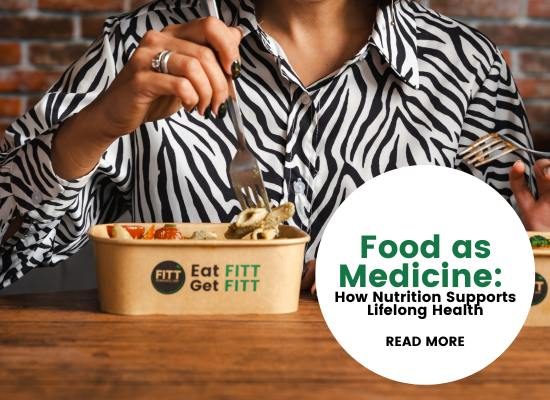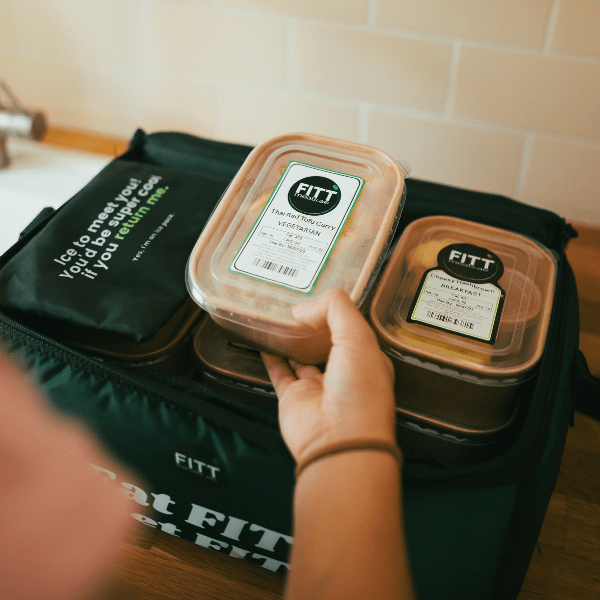Food as Medicine: How Nutrition Supports Lifelong Health
We’ve all heard the phrase “you are what you eat” and as it turns out, there’s a lot of truth in that statement.

Author: Helen Conway
Nutritionist
We’ve all heard the phrase “you are what you eat” and as it turns out, there’s a lot of truth in that statement. The food choices we make each day have a powerful impact on our health, not just in the short term, but throughout our lives.
With nutrition information more accessible than ever, many people are now recognising the powerful role food plays in long-term health. More than just a source of energy, what we eat can help prevent disease, support mental and physical wellbeing, and improve quality of life. Every meal is a chance to take care of our health from the inside out.
Nutrition and Chronic Disease Prevention
Chronic diseases such as type 2 diabetes, cardiovascular disease, and certain cancers are leading causes of illness and premature death globally — and diet plays a major role in both increasing and reducing risk.
Fibre-rich diets particularly those high in fruit, vegetables, legumes, and whole grains are strongly associated with a reduced risk of cardiovascular disease, type 2 diabetes, and colorectal cancer (Reynolds et al., 2019). Fibre also helps regulate blood sugar levels and supports gut health.
Limiting added sugars and sodium can reduce the risk of high blood pressure and improve cardiovascular outcomes (National Academies of Sciences, Engineering, and Medicine, 2019).
Healthy fats, such as monounsaturated and omega-3 fatty acids found in nuts, seeds, olive oil, and oily fish, have been shown to lower inflammation and support heart health (Mozaffarian and Wu, 2011).
At FITT Meals, our nutrition-approved meal plans are designed with these principles in mind, creating balanced, nutrient-dense meals that support your long-term health goals.
Food for Energy, Mood, and Brain Function
Beyond disease prevention, what we eat influences how we feel — physically, mentally, and emotionally.
Complex carbohydrates (such as wholegrains, oats and legumes) provide a steady release of energy, helping to maintain focus and reduce fatigue compared to high-sugar foods that tend to lead to energy crashes (Slavin, 2013).
Omega-3 fatty acids, especially those found in oily fish like salmon, are essential for brain function and have been linked to lower risk of depression and age-related cognitive decline (Bazinet and Layé, 2014).
Micronutrients such as iron, magnesium, and B vitamins contribute to normal brain function, mood stability, and sleep regulation (Kennedy, 2016).
When you eat well, you don’t just look healthier — you feel it too.

Gut Health and the Microbiome
Your gut contains trillions of bacteria and other microbes that make up the gut microbiome. Research continues to show just how much this ecosystem influences digestion, immunity, and even mental health.
Diets rich in plant-based foods and fermented products (like live yoghurt and kefir) encourage the growth of beneficial bacteria, increasing microbial diversity, which in turn is linked to several positive health outcomes (Valdes et al., 2018).
Prebiotic fibre from foods like onions, mushrooms, garlic, and oats can feed these microbes, improving gut health and reducing inflammation.
At FITT Meals, we make sure your meals include diverse vegetables, whole grains, and gut-friendly ingredients to keep your microbiome and your body thriving.
Healthy Eating Doesn’t Need to Be Complicated
We understand that most people want to eat healthier but struggle with time, cooking skills, or access to balanced meals, especially in fast-paced environments like the UAE.
That’s where FITT Meals can help. Our nutrition-approved meal plans are crafted to remove the guesswork. Every meal is portion-controlled, balanced, and developed with evidence-based nutrition at its core helping you meet your goals without the stress.
It All Starts with the Next Meal
Using food as medicine doesn’t mean giving up the joy of eating. It simply means being intentional and recognising that every bite is an opportunity to fuel, nourish, and care for your body.
Start small. Choose whole foods. Add more colour to your plate. And when life gets busy, lean on FITT Meals to support you.
References
Bazinet, R.P. and Layé, S., 2014. Polyunsaturated fatty acids and their metabolites in brain function and disease. Nature Reviews Neuroscience, 15(12), pp.771–785. https://doi.org/10.1038/nrn3820
Kennedy, D.O., 2016. B Vitamins and the Brain: Mechanisms, Dose and Efficacy—A Review. Nutrients, 8(2), p.68. https://doi.org/10.3390/nu8020068
Mozaffarian, D. and Wu, J.H.Y., 2011. Omega-3 fatty acids and cardiovascular disease: effects on risk factors, molecular pathways, and clinical events. Journal of the American College of Cardiology, 58(20), pp.2047–2067. https://doi.org/10.1016/j.jacc.2011.06.063
National Academies of Sciences, Engineering, and Medicine, 2019. Dietary Reference Intakes for Sodium and Potassium. Washington, DC: The National Academies Press. https://doi.org/10.17226/25353
Reynolds, A., Mann, J., Cummings, J., Winter, N., Mete, E. and Te Morenga, L., 2019. Carbohydrate quality and human health: a series of systematic reviews and meta-analyses. The Lancet, 393(10170), pp.434–445. https://doi.org/10.1016/S0140-6736(18)31809-9
Slavin, J., 2013. Fiber and Prebiotics: Mechanisms and Health Benefits. Nutrients, 5(4), pp.1417–1435. https://doi.org/10.3390/nu5041417
Valdes, A.M., Walter, J., Segal, E. and Spector, T.D., 2018. Role of the gut microbiota in nutrition and health. BMJ, 361, k2179. https://doi.org/10.1136/bmj.k2179





